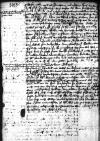Wir haben zuvor den erhaften ⌊Ludowicum Wersfelt⌋, Ewer Herlichkeit secretarienn, durch unser ⌊⌋ noch Ewer Herlichkeit auszuge von ⌊Marienburg⌋ ersucht, / und ihm etzliche dinge Ewer Herlichkeit von unsernt wegen zuzuschreiben auferlegt. / Czweifelen nicht, / dem szei also von ihm nachgekomen. / Bitten derwegen freuntlich, Ewer Herlichkeit wolte uns also inn dem bovolenn haben, / und das fleisig vortstellen, / sunderlich aber nicht vorgessen unser im besten kegen die ⌊alte⌋ und ⌊junge koningliche majestet⌋, / unser genedige fraw die ⌊koninge⌋, / und allen ⌊hern in der Chronn⌋ zugedencken [un]d uns denen aufs fleisigste zu bovelen. Worin wir Ewer Herlichkeit bei diesen boten zuerinneren nicht haben lassen mugen, der wir viel {gluch} glucks von Got dem almechtigenn ihre geschefte alda wol auszurichtenn wunschenn. Uns vorlang[t] auch fast zuerfharen, / wie die hern botschafter a... seinde ankomen, / und entfangen / welcher gestalt man ihnen audientz geben hat, / und was sunst von abrichtung dersu[l]ben zuhoffen sei. Von welchem allem bittenn wir freu[nt]lich Ewer Herlichkeit uns vortraulicher weise, / auch da was von newen zeitungen were, bei diesem boten berichten wolte. Alhie ist nichts newes, / ist ganz stille, / wie fleisig wir auch dornoch gefraget, / haben wir dennoch nichts, das wir Ewer [Herlichkeit] hetten schreiben mugen erfharen kunnen, / allein das ⌊furstliche durchlaucht⌋ fast damit umbgeth widderum ein new stedt in seinem lande aufzurichtenn, / deshalben ehr den ... sein ⌊underthan vom adel⌋ und stedten etzliche wochenn zu ⌊Koningsberg⌋ vorsamlet hat / un[d] sagt, das sie swer darzu seindt, und nicht gering[e] in erkein stewer vorwilligen werden. Bovelen hiemit Ewer Herlichkeit gotlichen genaden mit langweriger gesuntheit.

